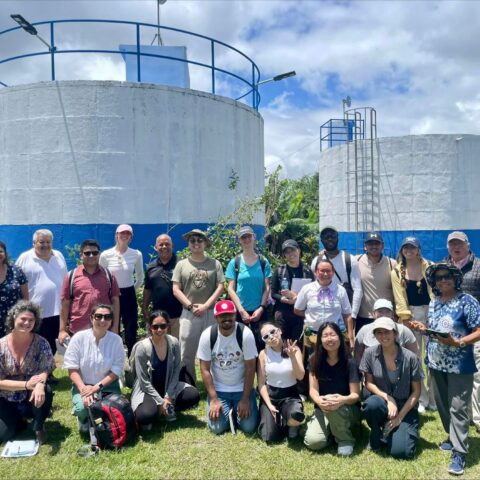Policy students tackle drinking water problems in Puerto Rico

Over 100,000 people in Puerto Rico get their drinking water from small rural community systems. These systems often do not receive adequate treatment, resulting in substandard water quality. The solution is to connect these communities with funding to allow them to make necessary improvements to ensure water quality and quantity and the ability to withstand natural disasters that plague Puerto Rico.
As a territory in the United States, Puerto Rico participates in the Environmental Protection Agency’s (EPA) Drinking Water State Revolving Fund (DWSRF) program, which provides hundreds of millions of dollars to address water quality issues. However, in the 25-year history of the DWSRF program, no community system in Puerto Rico has benefited from the program.
Twelve Master of Public Administration (MPA), Master of Regional Planning, and Infrastructure Policy Management and Finance certificate students took on the problem as an extracurricular practicum. During spring break, the group traveled to Puerto Rico to meet two of these community systems in rural parts of the territory, as well as with representatives of the regional office of the EPA and the Puerto Rico Department of Health, which is responsible for distributing DWSRF funds. The students’ objective was to understand the disconnect and propose policy pathways for the future.
The practicum is a practical experience option for students enrolled in the Infrastructure Policy Management and Finance (IPMF) graduate certificate, an initiative supported by the Cornell Brooks School and the Cornell Program in Infrastructure Policy (CPIP). The IPMF certificate is designed for students interested in working in the infrastructure space in planning, finance, project management, and operations roles and who want to gain a deeper understanding of infrastructure-related issues.
Forging pathways and empowering communities
The project was led by John Foote, a lecturer at the Cornell Brooks School MPA Program and an advisory board member of the Cornell Program in Infrastructure Policy. Foote has over 30 years of experience in the infrastructure arena and regularly teaches science, technology, and infrastructure policy courses.
“This is the fifth year our IPMF Fellows have tackled a particular infrastructure challenge in Puerto Rico. We have looked at broadband accessibility, rooftop solar for low and moderate households, resiliency investments, and public transit. This year, we thought water would be a great topic,” said Foote.
During their work, students uncovered numerous policy issues connected to regulation, coordination among various levels of government, and rural communities’ capacity to navigate complex federal programs.
Practicum participant Anastasiia Lykholat, MPA ‘25, summarized what the group saw: “We learned how challenging it is to connect the vision of federal and local policymakers with the realities of the rural communities to access equitable funding for clean water.”
“Still, despite the many challenges faced by the people with whom we had the privilege to meet, be it economic hardship, hurricanes, or earthquakes, they remain resilient and committed to empowering their communities,” she added.
Interdisciplinary collaboration
The culmination of the practicum project is a set of policy recommendations to modify how the DWSRF program is administered in Puerto Rico. Foote observed that all stakeholders desired to be more responsive to the needs of these communities: “The money is there, and the needs are apparent. Our objective is to identify ways to align the interests of all the parties.”
The IPMF practicum is not the only Cornell program focused on water issues in Puerto Rico. The WaterSAVerS project, a larger university initiative led by Ruth Richardson, associate professor of civil and environmental engineering, is designing and deploying gravity-powered water treatment plants using AguaClara technology for small and very small communities (SaVerS). Members of the WaterSAVerS project also participated in the field work during this field trek. The hope is that the policy and engineering students can, together, contribute to solving a pressing need in Puerto Rico.
